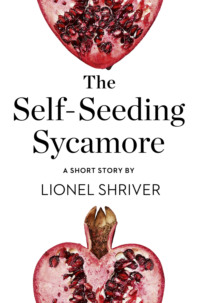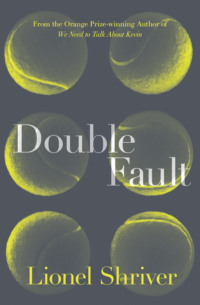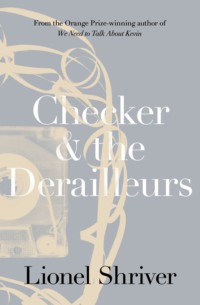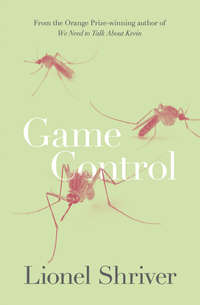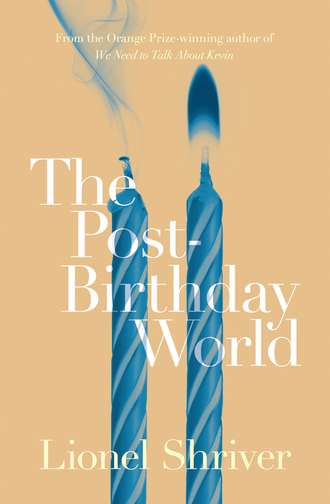
Полная версия
The Post-Birthday World
For Betsy, another American, everything was always simple. In fact, her cool, compass-and-ruler approach to circles that others found difficult to square had a curious brutality. When Jude and Irina had fallen out, she’d advised with a savage little shrug, “As far as I could tell, you’ve never liked her much anyway. Write it off.”
Irina wasn’t proud of the way she “dealt” with this quandary, meaning that she didn’t deal with it at all. Every day in the countdown to July 6, she promised herself in the morning to ring Ramsey in the afternoon, and in the afternoon to ring him in the evening. Yet propriety pertained even to night owls, and once it passed eleven p.m., she’d check her watch with a shake of the head and resolve to ring first thing the next day. But he probably slept late, she’d consider on rising, and the cycle would begin again. The sixth was a Saturday, and the Friday before she faced the fact that a single day’s notice so obviously risked his being busy that to ring at the last minute might seem ruder than forgetting the occasion altogether. Well, now she wouldn’t have to face down Ramsey Acton all by herself. A flood of relief was followed by a trickle of sorrow.
The phone rang Friday at nearly midnight. At this hour, she was so sure that it was Lawrence that she answered, “Zdravstvuy, milyi!”
Silence. No returning, “Zdravstvuy, lyubov moya!” It wasn’t Lawrence.
“… Sorry,” said an airy, indistinct British accent after that embarrassed beat. “I was trying to reach Irina McGovern.”
“No, I’m sorry,” she said. “This is Irina. It’s just, I thought it was Lawrence.”
“… You lot rabbit in—was that Russian?”
“Well, Lawrence’s Russian is atrocious, but he knows just enough—he’d never manage in Moscow, but we use it at home, you know, as our private language … Endearments,” she continued into the void. “Or little jokes.”
“… That’s dead sweet.” He had still not identified himself. It was now too awkward to ask who this was.
“Of course, Lawrence and I met because I was his Russian tutor in New York,” Irina winged it, stalling. “He was doing his doctoral dissertation at Columbia on nonproliferation. In those days, that meant you needed to have some Russian under your belt. These days, it’s more like Korean … But Lawrence has no gift for languages whatsoever. He was the worst student I ever had.” Blah-blah-blah. Who was this? Though she had a theory.
A soft chuckle. “That’s dead sweet as well … I dunno why.”
“So,” Irina charged on, determined to identify the caller. “How are you?”
“… That’d depend, wouldn’t it? On whether you was free tomorrow night.”
“Why wouldn’t I be free?” she hazarded. “It’s your birthday.”
Another chuckle. “You wasn’t sure it was me, was you? ’Til just then.”
“Well, why should I be? I don’t think—this is strange—but I don’t think, after all these years, that I’ve ever spoken to you on the phone.”
“… No,” he said with wonderment. “I reckon that’s so.”
“I always made our social arrangements through Jude, didn’t I? Or after you two split, through Lawrence.”
Nothing. The rhythm to Ramsey’s phone speech was syncopated, so that when Irina began to soldier on, they were both talking at once. They both stopped. Then she said, “What did you say?” at the same time he said, “Sorry?” Honestly, if a mere phone call was this excruciating, how would they ever manage dinner?
“I’m not used to your voice on the phone,” she said. “It sounds as if you’re ringing from the North Pole. And using one of those kiddy contraptions, made of Dixie cups and kite string. You’re sometimes awfully quiet.”
“… Your voice is wonderful,” he said. “So low. Especially when you talk Russian. Why don’t you say something.” Summat. “In Russian. Whatever you fancy. It don’t matter what it means.”
Obviously she could rattle off any old sentence; she’d grown up bilingual. But the quality of the request unnerved her, recalling those porn lines that charged a pound per minute—what Lawrence called wank-phone.
“Kogda mi vami razgovarivayem, mne kazhetsya shto ya golaya,” she said, binding her breasts with her free arm. Fortunately, nobody learned Russian anymore.
“What’d that mean?”
“You said it didn’t matter.”
“Tell me anyway.”
“I asked you what you had in mind for tomorrow night.”
“Mm. I sense you’re having a laugh.”
But what about tomorrow night? Should she invite him over, since he liked her cooking? The prospect of being in the flat alone with Ramsey Acton made her hysterical.
“Would you like it,” she proposed miserably, “if I made you dinner?”
He said, “That’s bleeding decent of you, pet.” The curious little endearment, which she’d only encountered once before when collaborating with an author from way up in Newcastle, was somehow warmer for being odd. “But I fancy taking you out.”
Irina was so relieved that she flopped into her armchair. In doing so, she pulled the cord, and the phone clattered to the floor.
“What’s that racket?”
“I dropped the phone.”
He laughed, more fully this time, round, and the sound, for the first time in this halting call, relaxed her. “Does that mean yes or no?”
“It means I’m clumsy.”
“I never seen you clumsy.”
“Then you’ve never seen me much.”
“I never seen you enough.”
This time the silence was Irina’s.
“Been a whole year,” he continued.
“I’m afraid Lawrence wouldn’t be able to join us.” Ramsey knew that, but she’d felt the need to insist Lawrence’s name into the conversation.
“Rather put it off, so Lawrence could come as well?”
He’d given her an out; she should jump at it. “That doesn’t seem very ceremonial.”
“I was hoping you might see it that way. I’ll call by at eight.”
For the most part, other people took couples as they found them: you were, or, at a certain point, you weren’t. At its most torrid, your love life was merely titillating to others, and the done-deal nature of established couples like Irina and Lawrence was doubtless a big bore. Romantic devastation occasioned, at most, an onlooker’s tinny sympathy or schadenfreude. Romantic delirium was even worse. Newly in love, you expected to draw envy or admiration, but were far more likely to attract a finger-drumming impatience for you to get over it. Of course, people did have opinions, about whether you were suited, or probably fought; almost always your friends—that is, friends of the couple—liked one of you more. But these opinions were cheap. They cost nothing to hold, and nothing to change.
Some friends regarded Irina-and-Lawrence as a factual matter, like the existence of France. Others relied on the couple as a touchstone, proof that it was possible to be happy; the role was a burden. Irina had a few companions who’d little time for Lawrence, and found him paternalistic or gruff; they regarded Lawrence as a friendship tax, the cost of doing business. But one way or the other, she didn’t care.
Love having come to her neither easily nor early, Irina accepted the fact that any minor contribution she might make to human affairs would have nothing to do with unprecedented achievement in courtship. No one would ever recount the peaceable, convivial union of a children’s book illustrator and a think-tank research fellow as one that launched ships or divided nations. No modern-day Shakespeare would squander his eloquence on the ordinary happiness—if there is such a thing—that percolated within a modest flat in Borough through the 1990s.
Nevertheless, Irina regarded her relationship with Lawrence as a miracle. He was a devoted, funny, and intelligent man, and he loved her. She didn’t care if feminists would have maintained that she didn’t need a man; she did need a man, more than anything on earth. When Lawrence was out of town, the flat seemed to generate an echo. She would not, any longer understand why she was here, in both the general sense of alive, and the specific sense of on a Georgian square just south of London Bridge. Many were the solitary evenings that she might have worked late in her studio, but the opportunity would be wasted. She would walk from room to room. Pour a glass of wine and leave it standing. Drizzle the stainless-steel drain board with corrosive to remove the lime scale. (So mineral was London’s tap water—reputed to have cycled through more human bodies than any liquid on the planet, and leaving a white, crusty ghost behind every evaporated drop—that it might have stood sheerly upright on the counter like the Cliffs of Dover without a glass.) But suddenly the energy required to wipe the glop away would elude her. She would go to bed, and wake to a reek in the kitchen from the chemicals left to seethe.
Shameful or not, having a man who loved her and whom she loved in return was the most important thing in Irina’s life. It wasn’t that she didn’t have strong and abiding subordinate affections, for Irina was far more sociable than Lawrence, and had put much effort into building a whole new set of comrades when they moved to London in 1990. Yet there were hungers that friends could never satisfy, and when you made the slightest bid to get them to feed this particular appetite they ran a mile. Moreover, it wasn’t that she cared nothing for her “art,” even if two histrionically self-involved parents in film and dance impelled her to couch the word in sour quotation marks. The illustrations, when they were working, were a joy. But the joy was greater when Lawrence eased up behind her while she was drawing, and purled peevishly in her ear that it would be nice to eat.
Monogamy had been effortless. Over nine years, Irina had been attracted to one of Lawrence’s colleagues from the Blue Sky Institute for exactly half an hour—at the end of which the man rose for another round of drinks, and she noticed that his backside was pear-shaped. That was that, like a scratchiness in your throat when you don’t end up coming down with a cold.
The period of solitary confinement while Lawrence was in Sarajevo had passed less painfully than most, but it is in the nature of the absence of pain that one fails to take note of it. Though she commonly prepared time-consuming meals for Lawrence without complaint, it was still festive to get out of fixing complete dinners with vegetables and grains. Alone, Irina had taken to skipping the whole nonsense altogether and working through the dinner hour. At around ten p.m., famished and pleasantly tired, she’d been downing a large, gooey slice of Tesco chocolate-cappuccino cake, whose very purchase was out of character; now on the eighth day of Lawrence’s Bosnian departure, she was on her third box. Later she played the sappy music that Lawrence detested—Shawn Colvin, Alanis Morissette, Tori Amos, all those girl singers recently in vogue who deployed excessive vibrato in the exaltation of gloom, or to declare brassily that they had no need for men and you knew they were lying. Unsmitten by Lawrence’s disapproving glare—his mother was an alcoholic—she’d been pouring herself a tiny nightcap before bed. Lawrence would never have countenanced cognac more than once a month. But he might have appreciated that the fumes of brandy swirled into heady reflections on how lucky she was to have found him, how eagerly she looked forward to his coming home.
In all, then, the week had been self-possessed. She’d allowed herself the little indulgences of the unwatched, including the gradual, contemplative incineration of a secret packet of cigarettes. But she’d made headway on her drawings, and a woman of Irina’s slight dimensions could afford a little cake. In two days, it was back to trout and broccoli, and she’d be sure to air the living room of its incriminating nicotine taint.
Thus when Irina woke that Saturday she was startled to discover that her smug self-possession had cracked like an egg. It was ridiculously late, after eleven, and she would normally arise by eight. Groggily she reconstructed that after that disquieting phone call with Ramsey, she had not, as she ought to have, cradled the receiver and flossed. There was, she recalled, a second brandy. In the kitchen, the chocolate-cappuccino cake was decimated. That’s right, she’d stood fretfully at the counter, slicing smaller and smaller pieces until there was nothing left. And oh dear, she had cranked up the volume of Little Earthquakes so high that a downstairs neighbour had arrived at the door in a bathrobe to complain. There would be hell to pay if Lawrence got wind of that, since he had only last month banged on the door below to get them to “put a lid on the salsa,” and he “didn’t mean the kind you dump on tacos, either.”
Befuddled, Irina put on the large stove-top espresso pot. Armed with a second cup, in the studio she could do no more with the half-finished drawing than stare. It was not possible to work. Clearly her finite reserve tank in Lawrence’s absence would last exactly eight days but not ten. Suddenly a whole lonely day and night and day again threatened only a debauched wooze of back-to-back fags, entire bottles of brandy, and endless fingerfuls of crass commercial icing whose main ingredient was lard.
Leaving for Borough Market, where she always shopped on Saturdays, she slammed the door resolutely behind her. Irina was going wobbly, and Irina had to be contained.
At the bustling covered market near London Bridge, the crowd was as ever abrasive with American accents. While it was irrational to bristle at the company of compatriots, one of the traits that Americans seem to share is a common dislike of running into one another in foreign countries. Perhaps it was having that mirror held up, reflecting an image so often loud, aggressive, and overweight. Irina didn’t have a big problem with being American herself (everyone has to come from somewhere, and you don’t get to choose), although, a second-generation Russian on her mother’s side, she had always presumed her nationality to have an opt-out clause. Maybe she winced a bit at the familiar skirl piping from Monmouth Coffees (“La-a-a-rry, they’re out of decaf Guatema-a-la!”) because she enjoyed the feeling of Britain being somewhere else, a sensation increasingly difficult to preserve in a town colonized by Pizza Hut and Starbucks. When she overheard another Yank inquire about the location of South-wark Street, with a hard R, it was hard not to feel tarred with ignorance by association.
On the other hand, out from under Lawrence’s influence, Irina sometimes indulged in what she privately termed mental kindness. The exercise had nothing to do with how she acted; as a woman who had grown up treated rather badly by classmates, she had developed a chronic horror of treating anyone badly herself. It didn’t have to do with what she said. It had to do with what went on in her head. There were merits to being nice in your mind—to hearing a fellow American mispronounce Southwark and deliberately choosing to think, Why don’t Brits cut us a little slack? Americans would never expect a Londoner to know that Houston was pronounced Hyooston in Texas, but Howston in Manhattan. Surely that beat grumbling sotto voce, “You stupid twat.” Of course, you could empathize or denounce your heart out within the privacy of your thoughts, and neither improve anyone’s day nor injure their feelings. Still, Irina was convinced that what went on in her mind mattered, and silently cast strangers in the gentlest possible light as a discipline. If nothing else, internal generosity made her feel better.
Mental kindness was not a concept she had shared with Lawrence, who was more apt to indulge in the likes of mental laceration. He was awfully hard on people, especially anyone he considered of inferior intelligence. His favourite word was moron. That harshness could be contagious; Irina had to guard against it. However, she should really exercise mental kindness first and foremost on Lawrence himself.
For one thing, Lawrence liked to keep his life simple, restricted to a few close friends and mostly to Irina, period—who had extravagantly benefited from admission to his tiny pantheon of the beloved. Scornfulness was a form of population control. Since you couldn’t invite the whole gamut of your acquaintances from your vegetable seller to your plumber for tea, you needed a filter. It just so happened that Lawrence’s filter was made of very fine mesh indeed.
For another thing, Lawrence was a genuine example of what was once standard-issue in the States but had latterly become an endangered American type: the self-made man. Lawrence clung fiercely to his condescension because his fingernails were sunk so precariously into the cerebral heights of a lofty British think tank. His upbringing was anything but intellectual. Neither of his parents had more than a high school education, and growing up in Las Vegas was hardly propitious preparation for earning a doctorate in international relations from an Ivy League school. A childhood of crass casinos had left him with a terror of being sucked back—into a world of lengthy debates over the quality of the eggs Benedict at the Bellagio. So all right, he was scathing, and sometimes had to be encouraged to give other people a break, to emphasize their finer qualities and to forgive their flaws. But it behooved her to see Lawrence’s tendency to pillory as itself such a flaw, and worthy of her own forgiveness.
She purchased Italian black kale, smoked boar sausage, and a malicious fistful of chilies from flirtatious vendors who didn’t know her name but had come to recognize her face. All too aware that going through the placid paces of marketing was slapping a superficial gloss of normalcy over an alarmingly unstable foundation, Irina also bought an armful of rhubarb to keep herself gainfully occupied when she got home.
Restored to the flat, she set about industriously constructing two rhubarb-cream pies, one for the freezer and one for Lawrence’s homecoming. She increased the recipe’s measure of nutmeg by a factor of five. A reserved woman of moderate inclinations to all appearances, Irina expressed an insidious attraction to extremes through decorative matters like seasoning, and few diners at her table suspected that her flair in the kitchen owed largely to a better-than-average mastery of the multiplication table. Fortunately, the fiddly lattice tops concentrated a mind that kept fragmenting like the fine strips of crust. Her hands weren’t precisely shaking, but they moved in spasmodic jerks, as if under strobe. (That cognac—surely there hadn’t been a third?) Lawrence wasn’t coming home a moment too soon. She strained against it on occasion, but maybe she needed his stern regimentation and sense of order. Without Lawrence, Irina would obviously turn overnight into a chain-smoking, cake-hoovering, brandy-addled hag.
The pies came out beautifully, the egg and sugar bubbling through the lattice into brittle browned hats, the acidic sting of rhubarb spiking the air throughout the flat, but pastry only saw her through to about five What’s more, while the pies were in the oven, she did something she very rarely got up to in the last few years, since Lawrence anyway, and once the pies were cooling, she did it again.
Six o’clock. Irina wasn’t prone to dithering over her appearance; most of her clothes were offbeat secondhand items from Oxfam outlets, for during their tenure here London had officially topped the charts as the most expensive city in the world. Ordinarily allowing fifteen minutes to dress was ample. Two hours was ridiculous.
Yet this evening, allowing a mere two hours was cutting it close.
The bed grew heaped with discarded blouses. Flailing in and out of frocks, she recalled a charming project from a few years ago titled I’ve Nothing to Wear!, about a little girl who hurricanes through her entire wardrobe one morning, flinging outfit after outfit from her chest of drawers. Lines from the book returned: “I do not like the button holes, I do not like the collar! If I wear the polka dot, I’ll bawl and shriek and holler!” The narrative arc had been predictable (big surprise, the little girl finally chooses to wear the first thing she’d put on), but the clothing flying through the air had a Futurist energy, and the illustrative opportunities had been rich.
Yet contrary to feminine convention, Irina was striking pose after critical pose in the full-length bedroom mirror with an eye to looking as dowdy as possible. While early in this melee she had toyed with the notion of the pale blue sleeveless that last year had threatened to keep Ramsey in their living room all the way to breakfast, she’d immediately chucked the idea. Was she insane? Instead she rummaged through the wardrobe’s nether regions for the longest skirts, the crummiest fits, and the least becoming colours she could find. Alas, Irina didn’t own a lot of ugly clothes, a lack she’d never before had occasion to rue.
This exercise in perversity was a waste. Ramsey was sure to select a ritzy restaurant where her few flashier garments would not look out of place. Lawrence always wore the most slovenly gear he could get away with, and on the few occasions she dared to don something chic he grew flustered: “It’s only a Blue Sky cocktail party. No need to make a big deal out of it.”
Calling time in this sartorial musical chairs, the intercom buzzer blared. Like a kindergartner lunging at the nearest empty seat, she was stuck with the outfit she had on: a straight-cut navy skirt that did reach nearly to the knee, though with that ubiquitous latex sizing its cling to her hips was woefully snug. At least the short-sleeved white top didn’t expose bare shoulders; better still, multiple launderings had worn a small hole in the neckline, lending the outfit a satisfying shabbiness. In fact, the ensemble was gloriously dull. Blue and white had the sexless connotations of sailor suits or high school football colours, and she fisted her dark hair into a hasty ponytail without using a comb. However, slipping into the only shoes that would go, she was exasperated to note that the high-heeled white sandals—broken down, ten years old if a day—tightened her calves and emphasized her slender ankles. Nuts, she concluded. I should have worn slacks.
Determined that she would not have him up for a drink, she grabbed the receiver and shouted, “Be right down!” and clattered out the door.
Out front, Ramsey stood propped against his opalescent-green Jaguar XKE, smoking a cigarette. Irina wouldn’t, of course, encourage anyone to smoke, but the habit suited him. On the phone his silences gaped, but in person he could fill the gaps with reflective exhalations. Leaning but perfectly straight, Ramsey himself resembled a snooker cue set against the car; his limbs reiterated the same attenuated taper. Saying nothing—what was wrong with the man?—he took her in as she strode from the step, inhaling the image along with a last drag. Flicking the half-smoked fag to the gutter, he sidled beside her without a word, ushering her to the passenger seat. His hand hovered near the small of her back but never quite touched her waist, as a parent keeps an arm at the ready with an unsteady toddler who wants to cross the room without help.
Nestled into the bucket seat not even having said hello either, Irina was visited by a sensation that she’d first experienced in high school, after her mother—grudgingly—had acceded to braces, and the hateful hardware had come off. It had taken a long time for it to sink in that boys suddenly seemed to find her a draw, and in truth this elevation of status from over twenty-five years ago had still not sunken in. Still, there had been certain evenings like this one, when she would be ushered into a young man’s car. The feeling was not of being attractive precisely, but rather of not having to entertain. It was breathtaking: to be ensconced in another person’s company, yet to be relieved of the relentless minute-by-minute obligation to redeem one’s existence—for there is some sense in which socially we are all on the Late Show, grinning, throwing off nervous witticisms, and crossing our legs, as a big hook behind the curtains lurks in the wings. Hands clasped calmly in her lap as the Jaguar surged from the kerb, staring serenely ahead as it lurched to a stop at the light, Irina realized that right at this moment the fact of her presence alone was its own redemption. Though she’d agonized over how to carry a conversation with Ramsey Acton, he was already exuding the purr of the supremely contented, giving every indication that he would remain just as contented for the rest of the night should she continue to say nothing.




